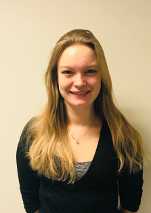
October 4, 2018, by Aleisha Turner
Computing Chemistry, Modelling Molecules
When Ellen Guest was struggling with A Level Chemistry, her teacher suggested she drop the course altogether. And yet she persisted.
Fast forward a few years and Ellen has an MSci in Chemistry and is Chemistry PhD candidate conducting important drug discovery research. You might assume this type of work is conducted in a traditional chemistry lab, but Ellen’s field is computational chemistry and much of her research is done on the University’s high performance computer (HPC). I talked to Ellen recently about her research and life as a woman in STEM.
“I’m looking at modelling protein ligand complexes to find the best potential candidates for synthetic drugs to treat idiopathic pulmonary fibrosis. No one knows what causes the disease and there’s no cure, so drugs are focused on slowing it down and improving quality of life.”

Ellen Guest, PhD Candidate in Computational Chemistry
In order for pharmaceutical companies like GSK (who partly fund Ellen’s research) to quickly produce synthetic compounds, they need computational chemists like her to weed out thousands of potential drug candidates through molecular modelling. Ellen couldn’t do this work without the University’s High Performance Computer which was recently upgraded and renamed ‘Augusta’ which was the first name of Ada Lovelace . The new and improved Augusta HPC is just one of the Digital Research Services recently launched to University of Nottingham researchers.
“Through my research I can predict which chemicals will be the most effective which narrows down the focus for the chemists who synthesize chemical compounds for testing, and ultimately clinical trials. The modelling simulations run over about four days on the HPC; it would be impossible to run them on a standard PC.”
Ellen is one of five female scientists giving a paper at a symposium on Computational Science next week in honour of Ada Lovelace. Ellen’s talk will cover “Molecular Simulation for Drug Discovery”. While more girls and women are being inspired to study STEM subjects by initiatives like Ada Lovelace day, there are still areas that are male dominated. “At the PhD level in computational chemistry there are more male students than female. But at undergraduate level there was an even split in my cohort and in the current undergraduate groups coming through. There has definitely been a change in the last couple of years.”
The biggest influences on Ellen’s decision to study science were her teachers apart, maybe, from that one A-Level chemistry teacher (who was male, by the way). This inspiration from educators has continued throughout her undergraduate and graduate studies. “My supervisor, Professor Jonathan Hirst, has been a great help and so has Professor Elena Besley, she’s a great example of a strong, female scientist and she really cares about her students.”
Following the completion of her PhD, Ellen would like to work in Science communication and outreach to inspire the next generation of female scientists.
The Ada Lovelace Day symposium will take place 1-3pm on Tuesday, 9 October in the NMRC seminar room followed by refreshments.
1:00 pm Welcome and Introduction from the Chair (Harriet Åhlgren)
1:05 pm SilkeWeinfurtner “Gravity Laboratory”
1:25 pm Tania Dottorini “Modern Challenges for Bioinformatics and Machine Learning”
1:45 pm Ellen Guest “Molecular Simulation for Drug Discovery”
2:05 pm Ivette Fuentes “Alice Falls into a Black Hole: A Journey to Find the Connections Between Quantum Information and Relativity”
2:25 pm Elena Besley “Materials Modelling: Connecting Communities”
2:45 pm Closing remarks (Jonathan Hirst)
No comments yet, fill out a comment to be the first

Leave a Reply